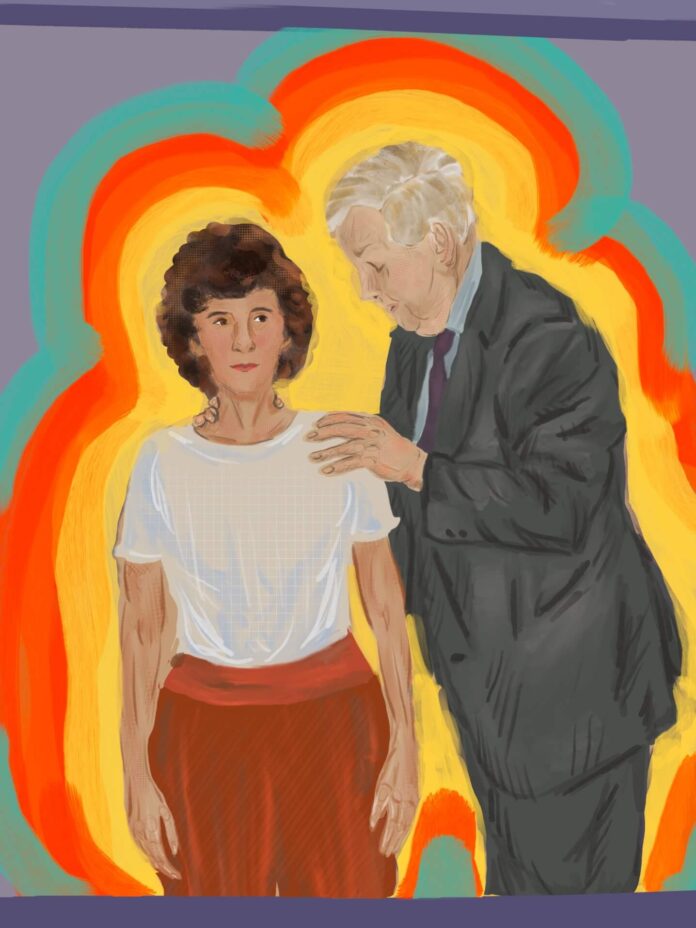The world moves fast. So fast that in that hurricane of parties, papers, job searches, friends, family, relationships and all the while trying to figure out who you are, there seems to be never a break, nowhere to sit and just be. But in every hurricane there is an eye, where the wind slows down to a stop, and you can observe everything, all of the nasty, stressful, exciting things swirl around you without sweeping you into the storm. Four years ago when I started the Alexander Technique in Occidental’s music department, I finally found that eye.
There are many ways to characterize the Alexander Technique, but I find that the following will help you understand how it is unlike other forms of meditation or awareness methods. The Alexander Technique brings you back to an innate psychophysical state by giving you the tools to get out of your own way. To say the practice allows you to overcome obstacles would not be accurate. Instead, it offers you a way to undo a pattern for something new to take its place.
My friends often ask me what this mysterious one-hour class is all about. Sometimes I answer with a posture or breathing class, a mind-body meditation, psychophysical therapy or even just an anti-anxiety class.
For me, it is all these things and so much more.
I was fortunate to find kindness and detailed instruction from my teacher, Frances Marsden, who is no ordinary instructor. Marsden first encountered the Alexander Technique in drama school in her early 20s and has taught it for 43 years. A pupil under Walter Carrington, Alexander’s protege, Marsden has taught actors, singers, musicians, athletes and all types of people looking to move through the world with grace and efficiency.
Now you might be wondering, “Okay, but who is Alexander?”
Frederick Matthias Alexander is the founder of the technique. He created the technique to solve some of his own troubles with the use of his voice on stage, a very similar reason to how the technique most helped me.
Carrington, Alexander’s star pupil, told his students to ask themselves: “How do I best set out to do what I am about to do?”
For much of my junior year as ASOC president, this is what I had to ask myself. Sitting in a room with administrators, I knew my presence was crucial to gaining support for students struggling with mental health issues brought on by COVID, among other reasons. At the time, I was fighting for mental health training for professors. I was scared and worried about students — hospitalizations were on the rise — and I had the opportunity to convey the gravity of the situation to those who could alleviate it. I felt the weight of that on my shoulders.
With Marsden, I needed to overcome my difficulties with public speaking. As long as I had known, people would ask me to repeat myself or slow down because I mumbled and rambled when I spoke. If I was going to help anyone, I needed to get this under control.
Sitting in a music practice room, I distinctly remember Marsden working with me. Like any session, I was focusing on my breath, releasing tension in my joints and finding a strong posture through bringing my head forward and up. Things became so slow, my jaw so relaxed, that I felt as if I couldn’t speak even if I wanted to. It was like I had forgotten how to use my voice.
Then, I spoke and a sound came out of me that I honestly didn’t know was possible. My voice was deep and sonorous, resonating from my diaphragm, clear as a day, and calm and confident. Startled by this new voice, it went away and a more raspy, rushed voice returned. And so we tried it again by first inhibiting and stopping in the moment to become entirely present.
I had to forgo my old patterns in order to meaningfully experience new ones.
Through this practice, while far from perfect today, I was able to speak in committee meetings with just a few bullet points in hand and deliver a confident, intentional and persuasive speech. I was effective, and I demonstrated what students needed without hesitation and in a way where I felt my own presence as a powerful force in a room with so many professional and experienced minds.
Always a participation-medal athlete, I also became significantly more coordinated in tennis, skiing and general athletics at 20 years of age. Hypertension in my back, something I had been struggling with since high school, now has nearly disappeared. I can slow down and find my voice when I choose to. I have reclaimed an awareness and control over my body, reducing feelings of anxiety and stress and, most importantly, the assurance that I can learn or improve anything.
Whatever I want to learn will at first feel unfamiliar, but the technique taught me how to embrace the unfamiliarity with the foundational principles of inhibition and good use, as taught in the class.
The practice, like anything, is not without its limitations. My life has improved in so many ways because I have not only been consistent, but also tied my personal discoveries in the class with other forms of mindfulness, education and work. Reduced to its simplest forms, the Alexander Technique forced me to do what we do everyday — stand, sit, breath, repeat. But I am living proof that foundations so simple, built and practiced over time, can lead to something extraordinary.
Contact Adam Cole acole2@oxy.edu
![]()































